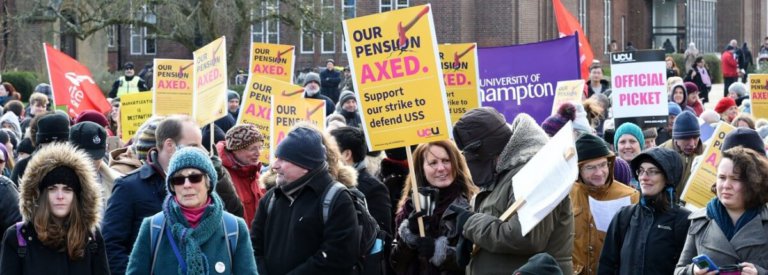
Students across UK universities should prepare for disruptions to their studies later this month. Following votes in favour of industrial action last week, the University and College Union (UCU)’s general secretary Jo Grady announced:
“The first wave of strikes will hit universities later this month unless the employers start talking to us seriously about how they are going to deal with rising pension costs and declining pay and conditions.
“Universities can be in no doubt about the strength of feeling on these issues and we will be consulting branches whose desire to strike was frustrated by anti-union laws about re-balloting.”
BREAKING NEWS: UCU announces eight days of strikes starting on 25 November at 60 UK universities #USS #UCUBallot https://t.co/dGOVALhtWT
— UCU (@ucu) November 5, 2019
Here’s what students should know about the upcoming action:
Why are people striking?
There are two separate disputes behind this strike – one on pensions and one on pay and working conditions. The former led to a huge wave of action two years ago when tens of thousands of lecturers and university staff walked out after unfair changes to their pensions scheme.
The new ‘Defined Contributions Scheme’ means lecturers will receive a lump-sum on the day of their retirement, its value depending on the stock market performance of an underlying investment, rather than the fixed annual amount that retired lecturers are currently rewarded. Many stand to lose up to £10,000 a year. The issue remains unresolved.
The second dispute pertains to unstable and poor working conditions. According to UCU, more than half of all academics are on temporary contracts and pay has fallen by 17 percent in real terms since 2009. Lecturers and staff want a fairer deal on pay, workload, equality and job security.
Jo Grady said the combined actions on working conditions and pensions reflected a workforce that felt it had “little to feel positive about”, with many workers barred from a decent pension by insecure contracts and reduced pay. https://t.co/mOBX66pFJy
— UCU (@ucu) November 6, 2019
When will the strike take place?
The strikes will take place over eight weekdays, starting from November 25 and ending on December 4. When striking staff return to work, union members will continue with other forms of industrial action, such as not covering for absent colleagues, refusing to reschedule lectures lost to strike action and working strictly to contract.
The universities involved
Sixty universities across the UK will be impacted. The 43 universities striking over both disputes are: Aston University, Bangor University, Cardiff University, University of Durham, Heriot-Watt University, Loughborough University, Newcastle University, Open University, University of Aberdeen, University of Bath, University of Dundee, University of Leeds, University of Manchester, University of Sheffield, University of Nottingham, University of Stirling, University College London, University of Birmingham, University of Bradford, University of Bristol, University of Cambridge, University of Edinburgh, University of Exeter, University of Essex, University of Glasgow, University of Lancaster, University of Leicester, City University, Goldsmiths College, Queen Mary University of London, Royal Holloway, University of Reading, University of Southampton, University of St Andrews, Courtauld Institute of Art, University of Strathclyde, University of Wales, University of Warwick, University of York, University of Liverpool, University of Sussex, University of Ulster and Queen’s University Belfast.
At the following 14 universities, staff will be walking out over pay and working conditions only: Bishop Grosseteste University, Bournemouth University, Edge Hill University, Glasgow Caledonian University, Glasgow School of Art, Liverpool Hope University, Liverpool Institute of Performing Arts, Queen Margaret University, Edinburgh, St Mary’s University College, Belfast, Roehampton University, Sheffield Hallam University, University of Brighton, University of Kent and University of Oxford.
Meanwhile, these three universities are striking over pensions alone: the Scottish Association of Marine Science, the University of East Anglia and the Institute for Development Studies.
How will students be impacted?
More than a million students could be affected by the action. As classes canceled by strikes will not be replaced by certain striking staff, affected students should expect this and make alternative arrangements with their lecturers. Contact hours may be lost, but this picket could serve as an opportunity to learn more about their lecturers and university staff’s working welfare (as well as how it ultimately impacts students), as well as an invaluable insight into organised labour in the UK.
Universities UK, the body that represents 136 national universities, said plans are in place to ensure minimal disruption to students and staff.
The Universities and Colleges Employers Association, which negotiates pay, has called the strikes “damaging to students”. However, research by UCU has found that students overwhelmingly support the strike and agree with better pay conditions for their lecturers instead of building vanity projects or hiring vice chancellors with six-figure salaries. Many students also came to sit-ins and teach-ins, as well as showing support in the last strike.
Liked this? Then you’ll love…
Why students should support college lecturers on strike
Pressure grows for UK schools to offer refunds as pensions strike continues







